After Camp, I actually moved to Utah for two years where I had a job working in wilderness therapy. So camp was actually a cool transition, but it was very different from Camp and was very challenging. I learned a lot about myself, which made me realize that I wanted to go to school and the science route. I moved back to Guam, where they have a great marine graduate program and got my Master’s, and did other research for 5 years. A year ago I had my interview for this current project. Now, I’m in Wellington, New Zealand as a student at the Victoria University of Wellington and the National Institute of Water and Atmospheric Research. I couldn’t pass up the opportunity.
Tell us about what you’re doing in your project.
I’m looking at kelp contribution because there’s a hypothesis that when kelp detaches from the reef, they float along and sink to the bottom, and they can hold in carbon and create carbon sinks in the deep sea. I’m researching if that’s true and how much they’re contributing in New Zealand.
Below are photos of the kelp Mari is studying.
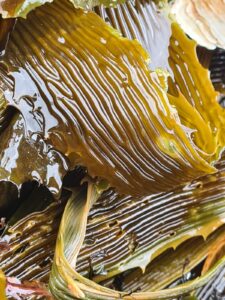
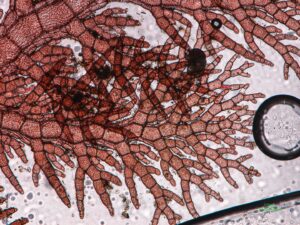
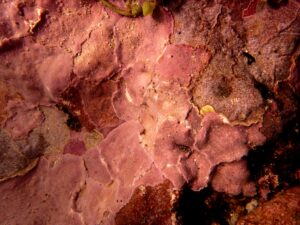
What’s ‘a day in the life’ of your research?
It varies each day, which can be the exciting part and also the overwhelming bit! Last week, it was heavy fieldwork, where I was collecting all of the data that I wanted, which involved multiple dives in a day to collect samples or surveying marine ecosystems by taking photos.
Then I go back to the lab to process and analyze the data. A large component of my current research is building a genetic library of seaweeds which I will use as a reference for identifying the presence of kelp species in the deep ocean through water and sediment samples. This is a growing method in science called, environmental DNA (eDNA). This will help us identify if kelp species are contributing to carbon sinks in deep ocean habitats.
What’s something cool that you’ve seen when diving?
That’s a hard question! I was actually able to see more on Guam since I did 250 work dives there. A couple of times I saw Octopus mating, and I’ve also played hide and seek with an octopus, also sharks, turtles, and manta rays. On a more nerdy level, I think seaweed is really cool, so collecting these rare species that we know nothing about is amazing! I enjoy every time I’m out there. It’s never the same dive.
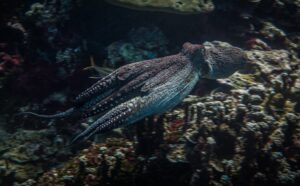
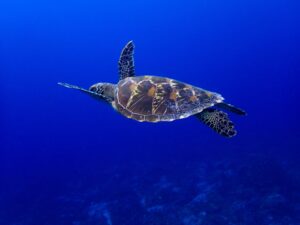
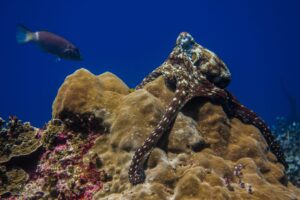
What got you interested in research and science?
In undergrad at Bowling Green State University, I always liked science and research, but I didn’t see it as a way my life could go. When I moved back to Guam, I met my Master’s supervisor who was passionate about seaweed and suggested volunteering to do lab and fieldwork. After that, I learned how cool seaweed is!
Also, growing up around the ocean, there are so many questions and stories that can be looked at that we don’t know about.
What helped you realize that academia was an option?
My job in Utah helped me realize how much I liked being outside, but I was more curious about psychology and research as opposed to the therapy side. Being from Guam helped facilitate my stepping into a more challenging research role, because it was a familiar place, and my family was also very supportive.
What’s the hope with the work that you’re doing?
My hope for any of my current and future research is to tell the story of organisms that are often overlooked. Telling these stories using scientific methods can help us recognize environmental changes as climate change continues to impact our world. Many of these organisms can tell us a plethora of cues and what needs to be conserved. Scientific results can be used for creating environmental policies that are very needed throughout the globe.
What are you doing when you’re not doing your work?
I picked up surfing, so I enjoy that in my free time. I’m also enjoying city life, and Wellington is a cool city that is artsy but has nature right outside of it. Building a community here as well, there are a lot of internationals here.
What would you say to someone that is interested in academia or any advice you’d give?
Know yourself and be comfortable with yourself in research before you get into it fully. It’s a humbling experience. Have a lot of kindness.
New Zealand has a good work-life balance, which is not as much the case in the US. It’s a competitive field, so make sure you’re enjoying your life outside of your research because it makes your research better.
What’s something you feel great about? An achievement, a milestone?
I’ve had a few publications come out in 2022, including my Master’s research. I’m actually presenting at a conference in Australia with all the seaweed people! It’s called the International Seaweed Symposium! (See the end of the article for links to Mari’s research!) This conference took place from February 19-24, 2023.
What are some of the challenges you’ve faced and how have you navigated those?
During my Master’s, I felt a lot of self-doubt, so that was challenging. It’s hard to be present with what you’re doing when you have that feeling. I used my support network and became my own support. I learned how to be really kind to myself. It took a lot of work to get to that point, and it was an interesting time.
What elements from Camp have helped you in your role?
It opened the door that you can have a career in a field that you really like. Camp gave me the opportunity to work in nature. I also learned the idea of teaching and also learning from others. Campers can teach you a lot about being aware of the learning process and being open to learning from others. It was a great place for a young adult to explore.
Who was someone at Camp that impacted you?
Pat Smith in my first summer. She definitely came with so much kindness to everyone and an understanding of people. Fernanda Darrow, who instructed tennis, was also so kind.
Do you have a favorite memory from Camp?
I lived in the lodge both summers, and there’s nothing specific, but the lodge age is hilarious. That age group can teach you a lot about having fun!
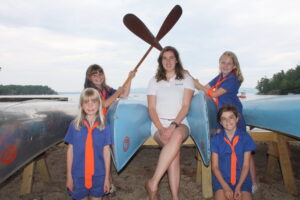
What did you enjoy most about Camp?
I enjoyed teaching swimming a lot. I was thinking about it the other day, but you can’t beat a sunny day at camp!
What elements of Wawenock do you use in your daily life?
I love the community built at Wawenock and also the support and compassion that girls and women can hold for each other. This is something I try to continue in my daily life, especially in science which is historically a male dominant field. We are seeing more people who identify as women go into science and create phenomenal research.
Last question – if someone were to visit New Zealand, what would you recommend?
Stay longer than two weeks! Get a car that you can camp in and go out past the big cities. Give yourself more time on South island vs. North island, unless you surf – then go to the North Island.
To connect with Mari, and to see some of her amazing photos, follow her on Instagram @mari.safari22. If you’re not on Instagram and want to reach out to Mari, email camp and we can get you in touch with her.
The Alumni Spotlight Series is a chance to highlight alumnae achievements in ‘the real world’ (as we say at Camp). We also hope that this will open up pathways to connect alumnae with one another. We want to celebrate alumnae that are doing amazing things in the world – this could be anything from running a marathon to operating a small business to being a parent to being a CEO. Achievements and success take different shapes and forms, and we look forward to highlighting alumnae at all stages of their journeys.
Links to Mari’s Publications: